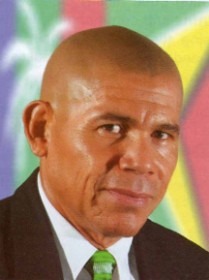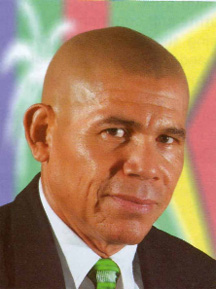With more awareness of national issues, Guyana Organisation of Indigenous Peoples (GOIP) Chief Dr George Norton says indigenous people could empower themselves as a constituency that possesses the influence to decide the outcome of national elections.

Norton, who is also a Member of Parliament and Vice-Chairperson for the main opposition PNCR, floated the possibility of Amerindians being the “swing vote” recently at the launch of Amerindian Heritage Month, where President Bharrat Jagdeo subsequently urged against any emphasis on the racial divide.
However, Norton told Stabroek News that it is argued that elections in Guyana amount to a racial census and racial voting is embedded in the country’s politics. “If that is so, then taking our small number, Amerindians could never hope, to use the vernacular, ‘to be pon top,’” he said. At the same time, he said if the “swing vote” does indeed lie with the Amerindians, a minority indigenous person could potentially run and win at the elections. “To use an example, you don’t need a Rosa to sit on a bus or a Martin Luther King Jnr to have a dream so that a minority Barack Obama…[can] win the White House,” he said, while suggesting that in theory an outstanding indigenous person like Anthony N Sagba award laureate Sydney Allicock could run and win. He said he was not promoting Allicock per se, and if Allicock was offended, he was apologising in advance.
Additionally, Norton said the President’s comments suggest that he was burying his head in the sand. “I am not in any way surprised – probably disgusted – but not surprised that he behaved in that manner,” he said. “If he could have done it to Yesu Persaud and Michael Correia, in almost a similar forum, [then] who am I?”
The 2002 census measured the Amerindian population at 9.2% of the total population, representing the fourth largest ethnic group. It represented a growth of just over 2.5%, since the previous census in 1991. Additionally, the highest levels of growth in the population were recorded in regions with large indigenous populations: Region 8 (Potaro/Siparuni), where there was a growth of 65.2%; Region 9 (Upper Takutu/Upper Essequibo), where there was a growth of 29.56%; Region 1 (Barima/Waini), where there was a growth of 26.84%; and Region 7 (Cuyuni/Mazaruni), where there was a growth of 8.53%.
He argued that indigenous people need to become aware of the issues so that they can make informed decisions and not simply take any situation at face value, which he suggested is now a national problem. “Nobody is any longer looking at the issues and the policies of the parties. I think, nationally, everybody’s looking to see if a new road is being built and things like that and not looking to find out how it’s coming. That’s why I am saying get involved, know what is going on, so when the politicians come and talk with you, you will be in a position to know what is right,” he explained.
Norton emphasised that when the indigenous people become informed and involved, they can then negotiate from a position of strength. “With that happening, they could find themselves in a position where they can call the shots because they know what the issues are,” he said. He warned that if they do not seek to ensure they are informed and hold together, they could very well end up being used.
Bearing gifts
He admitted that a large majority of the Amerindian communities are “definitely” behind the government at present. “There is no doubt about that, because of the same mendicancy syndrome; the same acceptance of handouts. There is no doubt that when the PNC was in power, villages used to vote 100% for the PNC. Now, that doesn’t exist at all. Hardly, if it does. Now you would find villages voting entirely for the PPP. And that is because the PNC is no longer in a position to go bearing gifts to them. The government is in a better position to do so.”
President Jagdeo has criticised Norton’s articulation of the “mendicancy syndrome” among the Amerindian population, saying that they do a lot with very little, particularly when compared with coastlanders. “I don’t know if the President has gone to as many villages as I have… but I would say, with all respect to the indigenous people, that yes there is some amount of mendicancy. And I say so with apologies to no one,” Norton maintained. “When you are going into a village where matches, soap and salt are luxuries, and you are gonna go in there and tell them you want them to support you and you ain’t bring nothing for them, then you got to be taking a lot for granted,” he said.
It is Norton’s belief that the situation exists because the education system has not benefited indigenous people. In this regard, he suggests that Amerindians themselves are largely responsible. He added that this is why he has been urging that they become as informed as they can be, using the power of knowledge to make the right decisions. They should take it upon themselves to bargain from a position of strength, he said, adding that leaders who are not looking out only for themselves by chasing ministerial portfolios are needed.
For opposition parties, Norton said, the cost associated with visiting small, indigenous communities in remote areas is difficult, particularly when the same funds could be used to reach ten times as many people on the coast. “It’s a hard decision to make just to get a small amount of indigenous votes when they can spend it on the chances of getting more elsewhere. But that’s a decision the parties have got to make. They’ve got to spend their resources in that direction. They don’t have a choice. If they really mean to have an impact on everything here in Guyana they have to,” he added.
Asked about the successes of the PPP/C administration in Amerindian development, Norton said it is obvious that during its almost two decades in office, some things have been done. At the same time, he noted that “the reality” for the Amerindian population is that it remains “vulnerable.” He noted that “You still have Amerindian girls in the Chinese restaurants working under really bad conditions; you still have coastlanders going into the villages [and] bringing out Amerindian girls and putting them to work as domestics and they end up doing other things; you still have a high percentage of Amerindian children suffering from diseases that many Guyanese don’t.” He added that while malaria continues to affect the Amerindian population at a level that warrants serious concern, there are villages where basic malaria medication is still in short supply.
Norton further said that there ought to be legitimate concern at the amount of resources that have been spent and in particular the manner in which they were spent. He pointed to the Low Carbon Development Strategy as an initiative deserving of support, but noted that the haste with which it has been pursued and the limited knowledge about it in Amerindian communities suggest less than genuine motives.
Reclamation
According to Norton, education remains the most crucial issues for the indigenous communities, and in particular the implications of the relationship between the people and their history on their self-esteem. He said it was his personal belief that the indigenous people suffer from low self-esteem, which they can rid themselves of once they know who they are, where they come from and where they are going. “We are always hearing about two world wars, but really it should be three because of the war of colonisation that the Europeans fought against the indigenous people of the Americas,” he argued, adding that the people should know of the historical horrors that have taken place. “Let there be no trace of a doubt that if there was ever a holocaust, it was the war against the indigenous peoples.”
The “forceful impact of the Christianisation” of the Amerindian population, Norton noted, also needs to be addressed. He said, “Down to a man, we have lost so many things that are important to us, especially our language. That is why we are no longer called Lokonos or Pemon or Kapong; we are called Akawaios and Arawaks and so on. Those are the names that people call us rather than what we call ourselves.” The same situation exists with village names, he added, pointing out that Christian names like St Cuthbert, St Ignatius and St Monica have been adopted. It is his belief that communities ought to reclaim their original names.
Moreover, he said there is also need to reclaim the Hallelujah religion and the Hallelujah church, which he described as “one of the most remarkable” acts of resistance to colonisation by the indigenous people. “…Right now it’s probably dying,” he said. “I think we need that so-called soul of the indigenous people to keep us together and I genuinely mean that when I say it.”

